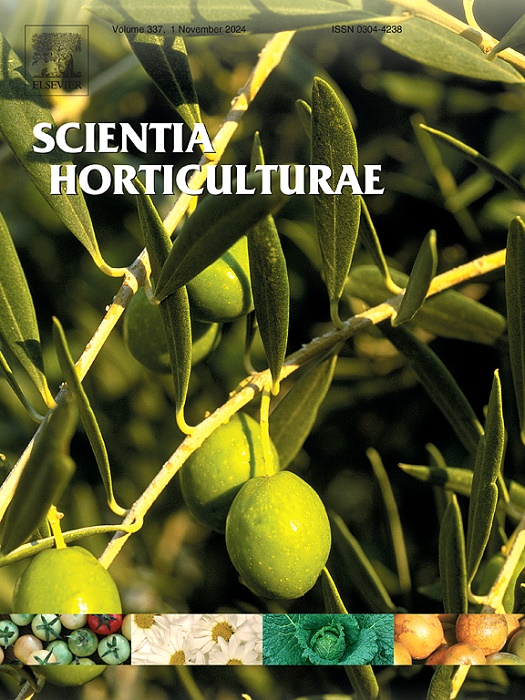IAA处理通过激活果胶酶编码基因加速了“朱尔斯·盖尤特博士”梨收获后的软化
IF 3.9
2区 农林科学
Q1 HORTICULTURE
引用次数: 0
摘要
“Jules Guyot博士”的梨(Pyrus communis L.)在成熟程度较低的情况下收获,在准备出售之前必须经过软化过程。植物激素生长素在不同的物种中具有不同的作用,然而,生长素调节“Jules Guyot博士”梨软化过程的分子机制尚不清楚。在本研究中,我们用IAA处理采收后的梨果实,并与对照组进行比较。我们观察到,与对照相比,iaa处理组的果实硬度下降得更快,乙烯释放量相应增加。此外,IAA处理提高了水溶性果胶和离子可溶性果胶的含量,但降低了共价结合果胶的含量。此外,通过转录组分析,我们鉴定出了15个果胶酶编码基因和16个与IAA相关的候选基因。基因表达和相关性分析结果显示,IAA处理诱导了PcGH3.1和PcILL3的表达,这两个基因与果胶酶编码基因PcPG1、PcPG3、PcPL8、PcPL15、PcPL18和PcPME63呈显著正相关。因此,IAA处理可调控多种果胶酶编码基因的表达,从而提高果胶酶活性,加速‘dr . Jules Guyot’梨采后软化过程。本文章由计算机程序翻译,如有差异,请以英文原文为准。

IAA treatment accelerates post-harvest softening in ‘Docteur Jules Guyot’ pear via activation of pectinase-encoding genes
‘Docteur Jules Guyot’ pears (Pyrus communis L.) are harvested at a lower level of ripeness and must undergo a softening process before being ready for sale. The plant hormone auxin has varying effects across different species, however, the molecular mechanism by which auxin regulates the softening process of ‘Docteur Jules Guyot’ pear remains unclear. In this study, we treated post-harvest pear fruit with IAA and compared them with the control group. We observed that fruit firmness declined more rapidly in the IAA-treated group, with a corresponding rise in ethylene release compared to the control. Additionally, the IAA treatment increased both water-soluble and ionically soluble pectin while the content of covalently bound pectin decreased. This was accompanied by a significant enhancement in pectinase activity, in addition, through transcriptome analysis, we identified 15 pectinase-encoding genes and 16 candidate genes related to IAA. The results of gene expression and correlation analysis showed that IAA treatment induced the expression of PcGH3.1 and PcILL3, and these two genes exhibited a significant positive correlation with the pectinase encoding genes PcPG1, PcPG3, PcPL8, PcPL15, PcPL18, and PcPME63. Therefore, IAA treatment regulates the expression of multiple pectinase-encoding genes, which in turn enhances pectinase activity and accelerates the postharvest softening process in ‘Docteur Jules Guyot’ pear.
求助全文
通过发布文献求助,成功后即可免费获取论文全文。
去求助
来源期刊

Scientia Horticulturae
农林科学-园艺
CiteScore
8.60
自引率
4.70%
发文量
796
审稿时长
47 days
期刊介绍:
Scientia Horticulturae is an international journal publishing research related to horticultural crops. Articles in the journal deal with open or protected production of vegetables, fruits, edible fungi and ornamentals under temperate, subtropical and tropical conditions. Papers in related areas (biochemistry, micropropagation, soil science, plant breeding, plant physiology, phytopathology, etc.) are considered, if they contain information of direct significance to horticulture. Papers on the technical aspects of horticulture (engineering, crop processing, storage, transport etc.) are accepted for publication only if they relate directly to the living product. In the case of plantation crops, those yielding a product that may be used fresh (e.g. tropical vegetables, citrus, bananas, and other fruits) will be considered, while those papers describing the processing of the product (e.g. rubber, tobacco, and quinine) will not. The scope of the journal includes all horticultural crops but does not include speciality crops such as, medicinal crops or forestry crops, such as bamboo. Basic molecular studies without any direct application in horticulture will not be considered for this journal.
 求助内容:
求助内容: 应助结果提醒方式:
应助结果提醒方式:


